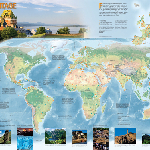 People value the cultural and natural heritage of mankind! Economists have even been able to put a monetary value on the importance we assign to that heritage. They measure how much people are willing to pay to travel to and stay at heritage sites. They measure how much property values are enhanced for property close to the sites. They measure how much people are willing to pay as entrance fees to enter the sites.
People value the cultural and natural heritage of mankind! Economists have even been able to put a monetary value on the importance we assign to that heritage. They measure how much people are willing to pay to travel to and stay at heritage sites. They measure how much property values are enhanced for property close to the sites. They measure how much people are willing to pay as entrance fees to enter the sites.If you doubt that people are willing to pay for the preservation of cultural and natural heritage, think about the governments that spend taxpayers dollars on national parks, monuments, and cultural heritage sites! Consider also the donations that people make every year to the Sierra Club or World Wildlife.
Economists have even done surveys documenting that people value the knowledge that cultural and natural heritage is being preserved even in sites they will never themselves visit.
UNESCO's World Heritage Convention has more signatories than any other international treaty or convention. It gives UNESCO no legal authority to protect world heritage sites, nor to impose sanctions where sites are not being protected. It simply provides a mechanism by which sites nominated by the governments of the countries in which they exist can be subjected to impartial review and judgment. The World Heritage List is the best, most valid list of the wonders of the world. Incidentally, every site nomination is reviewed by one of three independent organizations:
- The World Conservation Union
- The International Center for the Study of the Preservation and Restoration of Cultural Property
- The International Council on Monuments and Sites
Essentially, the World Heritage Convention is an agreement among the vast majority of the nations of the world that "if you will protect the world heritage sites in your country, I will protect those in mine". For fractions of a penny per person per year, the World Heritage Center provides a mechanism that enables the nations of the world to cooperate to protect and maintain the common heritage of mankind!
No wonder this program is the flagship program for UNESCO!
It deserves all our support.
It deserves all our support.
Of course, one problem is that not everyone values our world heritage equally, and not everyone has the ability to pay for its preservation. The problem is especially severe in communities and countries that possesses world heritage sites but are too poor to conserve and protect them properly without outside help. UNESCO's World Heritage Fund has some resources to help such countries. Simply listing as a World Heritage site helps countries and communities to raise funds needed for protection of the site, especially encouraging national governments to provide support to local communities for the purpose.
The development of concepts of sustainable tourism and sustainable management of natural parks and nature reserves has helped in the recognition that poor local communities must be able to support themselves while they safeguard the sites in their neighborhood. Thus mechanisms for the creation of buffer zones with limited use, and the creation of jobs in conservation, protection and the tourism industry have been promoted. (Those of us who are fortunate enough to live in the greater Washington DC metropolitan area know just how valuable cultural tourism can be to a city!) Again, designation of a site as a World Heritage Site has real economic value to the community that protects that site.
Here are some resources to help understand the economists views on the economic valuation of world heritage:
No comments:
Post a Comment